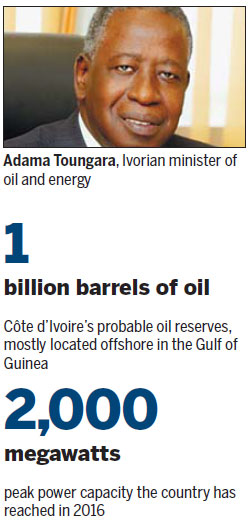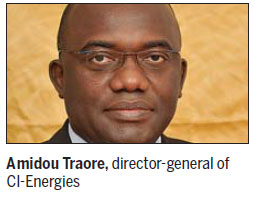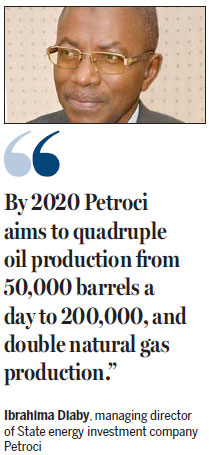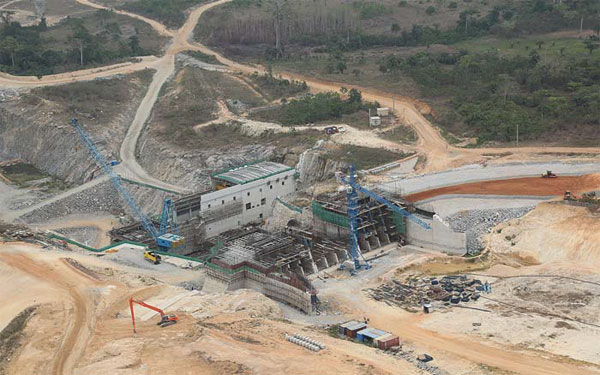Large reserves to maintain energy leadership
|
The Soubre dam is scheduled to be completed in 2017, a year earlier than expeCoted. Provided to China Daily |
To meet mounting domestic and external demand, Cote d'Ivoire plans to tap offshore hydrocarbon wealth
Cote d'Ivoire, Liberia and Sierra Leone have all been immersed in bloody civil conflicts over the past two decades, but only one has fully emerged from the trenches.
While economic and political chaos defines its neighbors, Cote d'Ivoire has become a regional beacon of power, quite literally. The country now plans to sell surplus electricity generated by its surging energy sector to seven power-starved nations in Western Africa.

Liberia and Sierra Leone, along with Guinea, are only the latest nations to be invited to tap into the Ivorian powerhouse, which already provides electricity to Ghana, Mali, Togo and Burkina Faso.
This new extension of 83 megawatts through the West African Power Pool, the sub-region's electricity community, is nonetheless bold considering Cote d'Ivoire's high rate of sustained economic growth, which the World Bank projeCoted will exceed 8 percent over the coming years, promising to add mounting pressure from domestic demand.
But Ivorians are not short on ambition.
"Cote d'Ivoire wants to guarantee self-sufficiency to meet growing needs, with excess production then continuing to be exported to neighboring countries," said Ibrahima Diaby, managing director of State energy investment company Petroci.
The country was producing 1,400 megawatts when the recent economic boom started, and at the peak so far in 2016 power capacity has reached 2,000 megawatts.
The government is now planning to double that supply to 4,000 megawatts by 2020 to maintain electricity exports in line with the anticipated needs of new businesses.
Over the coming years, it's expeCoted that Ivorian industry will expand substantially, especially in the manufacturing and food processing sectors, and this will increase demand for electricity.
The challenge is to adequately increase generation across diversified sources to meet both local and external needs.
About 67 percent of Cote d'Ivoire's power supply is fed by three thermal power plants, suggesting there is room for growth in hydrocarbons.
Luckily for Cote d'Ivoire, it has ample reserves to work with. According to Petroci, the country has reserves of up to 1 billion barrels of oil and 34 trillion cubic meters of natural gas, mostly located in large offshore basins in the Gulf of Guinea.
"Tapping these reserves, by 2020 Petroci aims to quadruple oil production from 50,000 barrels a day to 200,000, and double natural gas production from 250 million cubic feet (7 million cubic meters) a day to 500 million," Diaby said.
This increase in production will create more downstream industries, he said. "We have the ambition to create an oil products hub, a sort of African Rotterdam."

To realize this ambition, Petroci has draw up big-ticket projects, including the extension the Abidjan-Bouaké pipeline and the installation of a floating storage and re-gasification unit, which would allow for the regasification of up to 46 million cubic meters per day.
"These projects are expensive, so we have created a data room to showcase them to potential investors," Diaby said.
Exploitation of the country's rushing rivers also has a future in Cote d'Ivoire. Hydro-generated electricity already accounts for over one-third of the energy mix, and provides a cheap source of electricity.
Today, the Soubre hydroelectric dam is the poster child of Cote d'Ivoire's hydro ambitions. The project lay dormant for four decades, but when it comes on stream in 2017, a year earlier than expeCoted, it will become the country's largest hydropower facility, providing 250 megawatts of electricity.
"Given projeCoted demand, the dam will help us reach our target of 10 percent annual growth in electricity production," said Amidou Traore, director-general of CI-Energies, a State-run company in charge of production and distribution of electricity, and the key local player in the dam.

Yet, while the dam is dwarfed by larger hydropower facilities in the region, namely in Ghana, it sets a precedent for future engagement with the dam's main contractor, China's Sinohydro, the world's largest hydropower construction company. Beijing-based Exim Bank is backing 85 percent of the project, valued at 4.3 billion yuan ($529 million).
"The Soubre dam is largely thanks to Ivorian President Alassane Ouattara having actively encouraged a strong relationship with China," said Adama Toungara, minister for oil and energy. "The success of this project has led to discussions with Sinohydro regarding three other dams downstream from Soubre."
These proposed hydropower plants would generate a further 500 megawatts. Talks have also included plans for investing in gas turbines, coal-fired facilities, solar plants and biomass sources.
Cote d'Ivoire is an unlikely energy broker. Only 26 percent of Ivorians have access to electricity, compared to 74 percent of Ghanaians, according to data from the United States Agency for International Development.
But most unpowered Ivorians reside deep in rainforests, and the government is now working to connect them to the country's grid.
"Through the Electricity for All program, we hope to supply electricity to every village with 500 people or more by 2017," said Toungara.
Again, Chinese finance is involved, and has been since 2011 when the program began, providing almost all of the allotted investment of 6.83 billion yuan.
It is the kind of support that will ensure Cote d'Ivoire remains a dependable supplier of electricity.
justin@the-businessreport.com
(China Daily 08/08/2016 page27)















